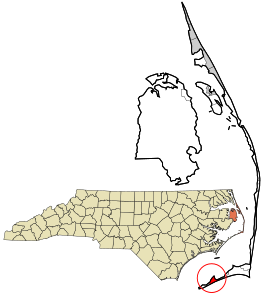Hatteras, North Carolina
Hatteras, North Carolina | |
|---|---|
 Location in Dare County and the state of North Carolina | |
| Country | United States of America |
| State | North Carolina |
| County | Dare |
| Area | |
• Total | 1.68 sq mi (4.36 km2) |
| • Land | 1.58 sq mi (4.08 km2) |
| • Water | 0.11 sq mi (0.29 km2) |
| Elevation | 3 ft (0.9 m) |
| Population (2010) | |
• Total | 504 |
| • Density | 320/sq mi (123.6/km2) |
| ZIP code | 27943 |
Hatteras is a census-designated place (CDP) in Dare County, North Carolina, United States, on the Outer Banks island of Hatteras. As of the 2010 census it had a population of 504.[1] North Carolina Highway 12 passes through the community linking it to Frisco and Ocracoke (via a ferry in Hatteras). It is southwest of the famous Cape Hatteras and the Cape Hatteras Lighthouse in Buxton. The inlet that the ferries use is Hatteras Inlet.
The residents of Hatteras are governed by the Dare County Board of Commissioners. Hatteras is part of District 4, along with Avon, Buxton, Frisco, Rodanthe, Waves and Salvo.
Attractions and recreation
Hatteras is best known as a fishing and vacation destination. This community offers visitors ample opportunities for recreation, sightseeing, and remote relaxation especially on its beautiful beaches.
Watersports are plentiful on both the ocean-side and the sound-side of the village. Proximity to the convergence of the Labrador Current and the Gulf Stream result in the largest surf available on the East Coast. On the protected Pamlico Sound side of the island watersports such as windsurfing, kayaking, kiteboarding, and swimming are all readily available and accessible.
Fishing is a major source of recreation as well as revenue in Hatteras. In shore charters are available to fish in the Pamlico Sound. Deep sea charters are also available at Hatteras Harbor Marina and Oden's Dock. Deep sea trips take anglers to the warm waters of the Gulf Stream to fish for blue and white marlin, tuna, wahoo and mahi mahi. It takes approximately one and a half to two hours to reach the Gulf Stream from Hatteras Inlet.
Pamlico Sound, which separates Hatteras and Ocracoke Islands, is one of the largest estuarine systems in the world and offers an almost limitless variety of fishing opportunities.[2]
History
Hatteras was named after the Hatteras Indians.[3]
Hatteras Village was cut off from the rest of the island on September 18, 2003,[4] when Hurricane Isabel washed a 3,000 feet (910 m)* and 30-foot-deep (9.1 m) channel called Isabel Inlet at the north end of Hatteras village. The tear was subsequently repaired and restored by sand dredged by the Army Corps of Engineers.[5]
The Ellsworth and Lovie Ballance House and Hatteras Weather Bureau Station are listed on the National Register of Historic Places.[6]
Public services
Residents of Hatteras are served by the Cape Hatteras Elementary and Secondary School located on NC 12 in Buxton.[7]
Gallery
-
View of Pamlico Sound, near Hatteras Inlet from a home in Hatteras on a windy day in June 2007
-
View of homes along oceanfront in Hatteras in June 2007
-
Busy Hatteras Ferry Lines on a Wednesday in June 2007
-
Ferries making trip from Ocracoke to Hatteras, June 2007
-
Water tower
-
Historical US Weather Bureau office
References
- ^ "Geographic Identifiers: 2010 Demographic Profile Data (G001): Hatteras CDP, North Carolina". U.S. Census Bureau, American Factfinder. Retrieved November 24, 2015.
- ^ Bill Blue, ed. (Summer 2007). "Fishing: Hatteras and Ocracoke Style, Sunny Day Guide". Surfside East. pp. 34, 63–65.
- ^ Gannett, Henry (1905). The Origin of Certain Place Names in the United States. Govt. Print. Off. p. 152.
- ^ "AFTER THE STORM: THE SCENE; Fickle Isabel Devastates Parts of Hatteras", in The New York Times, September 20, 2003. Retrieved May 8, 2008.
- ^ Hatteras Village, "N.C., Breach Cut by Hurricane Isabel Is Filled with Sand," in The News & Observer, November 4, 2003. Retrieved May 8, 2008. [dead link]
- ^ "National Register Information System". National Register of Historic Places. National Park Service. July 9, 2010.
- ^ Dare County Schools Website







